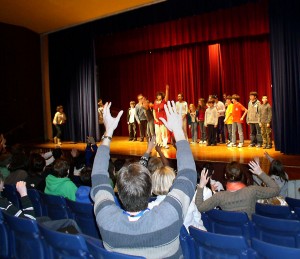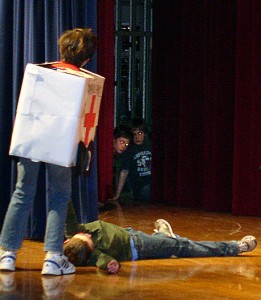By Casey Hans
AAPS News Service
Instead of clapping, dozens of people in the audience lift both hands over their heads and wave them in the air. Between each humorous skit on the Clague Middle School stage, the audience responds both with laughter and … more waves.

On stage are 23 Clague students – some from the school’s general education population and others from Katie Kiolbasa’s self-contained special education room. They have become fellow thespians and friends, a relationship developed through a program called ACT-UP, which stands for “achieving connections through understanding peers.”
The waving-in-lieu-of-clapping was done to allow students sensitive to noise to enjoy the accolades without becoming anxious, explained speech therapist Ben Darragh, who has been involved with the ACT-UP class which started in the fall. Darragh said the new performing arts elective has enthused the entire school.
“We thought it would be good to have an activity for general ed and special ed kids to work together, to create something,” he explained. “The general education kids accept the role of mentoring or guiding. It’s good to have them be teachers and look out for someone other than themselves.”

Teacher Jennifer Quint, a language teacher who coordinates the ACT-UP class, said the class has broadened her horizons.
“It’s been wonderful. It’s my favorite class of the day,” said Quint. “And now we’re going to keep it going. Hopefully, we can keep it on a two-to-one ratio (of general ed students to special ed students.)”
ACT-UP came into being somewhat by accident: When Quint returned from a maternity leave last year, she was given a theater elective to teach, but the class was accidentally left off of the schedule. When a small handful of students did enroll, some were general education students and the others were from the school’s special education program.
From that, the idea for an adaptive peer mentoring performing arts class took hold.
Darragh found a book with topics for skits and students were off and running, writing dialogue, creating needed costumes and props and preparing for their performance together on stage. Not only has it allowed students to be creative, he said, but also works to bring the school together.
The ACT-UP performing arts class comes on the coattails of a year-old mentoring program at the school, which started with sixth-graders last year. It has surged in popularity this year, with some 40 students from all grades rotating through visits to Kiolbasa’s special education class where they have made new friends and helped to break down disability barriers in the school.
“It’s been wonderful. It’s my favorite class of the day. I can’t wait to get there,” says teacher Jennifer Quint
Connor, a sixth-grader, is a first-year mentor. “We play games, socialize with them,” he said of his friends in the special education room. “They’re just like us. They’re just kind of people who need friends. Even though they might seem different at first, they’re the same as you and me.”
Kiolbasa said the number one benefit of students mentoring is the friendships that are developed within her contained special education classroom family. “I’ve seen kids come in here before the bell and some have wanted to do things outside of school,” she said. “I think they do it for different reasons. Some of them come every day.”
“My hope is that every school that has a self-contained room has a program like this,” she added.
Kiolbasa said this is Clague’s first experience with the mentoring concept, but noted that Forsythe Middle School has had a successful mentoring effort through their gym program that brings special education and general education students together.
The Clague programs not only draw in students, but other staff members as well. Paraprofessionals involved with the programs include Robyn Conn, Ophelia Schoen and Sheryl Calcagno. Also involved is school psychologist Cathy Murphy, who said the mentoring and ACT-UP programs have built a camaraderie around the school.
“They (students) recognize that everybody’s different,” she said. “There are definitely some who don’t see themselves in a mentoring role, but in a friendship role. With some of the kids, it’s made a positive impact on their behavior in other areas.”
Brianna is a Clague seventh-grader who is a second-year mentor. “I’m a veteran,” she said. “My locker was just outside (of the special education room.) I didn’t know what was going on, so I checked it out.” She said “the kids are a lot happier” with the mentoring program. “You really do have fun, like you would with any other kids.”
Her favorite part of mentoring is seeing her new friends smile. “It’s fun. You see them starting to shine,” she said. “I think it’s more fun than hanging out with kids at advisory.” Daily advisory time is typically when student mentors visit the special education room.
Quint said her experience with ACT-UP and the peer mentors at Clague has changed her life for the better, both personally and professionally. “Every day when you leave here, you don’t escape without a hug from somebody,” she added.
Casey Hans edits this newsletter for The Ann Arbor Public Schools. E-mail her or call 734-994-2090 ext. 51228.

